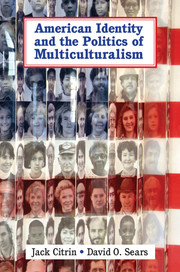Book contents
- Frontmatter
- Dedication
- Contents
- List of Figures
- List of Tables
- Preface
- Prologue
- 1 The Challenge of E Pluribus Unum
- 2 The Political Psychology of Identity Choice
- 3 Contours of American National Identity
- 4 The Ethnic Cauldron and Group Consciousness
- 5 Public Opinion and Multiculturalism’s Guiding Norms
- 6 When Do Ethnic and National Identities Collide?
- 7 Group-Conscious Policies: Ethnic Consensus and Cleavage
- 8 The Dynamics of Group-Conscious Policy Preferences
- 9 Multiculturalism and Party Politics
- 10 Conclusion
- Appendices
- Bibliography
- Index
- References
9 - Multiculturalism and Party Politics
Published online by Cambridge University Press: 05 September 2014
- Frontmatter
- Dedication
- Contents
- List of Figures
- List of Tables
- Preface
- Prologue
- 1 The Challenge of E Pluribus Unum
- 2 The Political Psychology of Identity Choice
- 3 Contours of American National Identity
- 4 The Ethnic Cauldron and Group Consciousness
- 5 Public Opinion and Multiculturalism’s Guiding Norms
- 6 When Do Ethnic and National Identities Collide?
- 7 Group-Conscious Policies: Ethnic Consensus and Cleavage
- 8 The Dynamics of Group-Conscious Policy Preferences
- 9 Multiculturalism and Party Politics
- 10 Conclusion
- Appendices
- Bibliography
- Index
- References
Summary
The multicultural moment in American politics begins in the turbulent 1960s. Cultural nationalism and cries for black power among African-American activists; the embrace of affirmative action by the Johnson administration and then, more briefly, by Richard Nixon; immigration reform and its consequences for language policy; and the emergence of feminist and gay rights movements together made claims based on group identity a prominent feature of political debate. The multicultural movement argued that representation and recognition of disadvantaged groups – defined variously by race, ethnicity, language, gender, or sexual orientation – is paramount to attaining equal access to desired resources in society, whether money, power, or status. And these historically disadvantaged groups and demographic minorities merited special assistance from the government to overcome the obstacles they confront in the crucible of majoritarian politics.
The gradual adumbration of these ideas in elections, government policy, and academic debates proceeded apace through the 1970s and beyond. As multiculturalism and diversity became political catchwords, the social and ideological underpinnings of party politics underwent radical change. The civil rights movement precipitated the collapse of the New Deal coalition that had undergirded the dominance of the Democrats in national politics between 1932 and 1968. Civil unrest, the war in Vietnam, and the issues of “acid, amnesty, and abortion” further prodded a realignment that ended the South’s exceptional status as a one-party Democratic region. This nationalization of electoral politics culminated in the Republican takeover of Congress in 1994. But well before that the two major parties began to polarize, with potential implications for conflict over policies related to the balance of national and ethnic identities.
- Type
- Chapter
- Information
- American Identity and the Politics of Multiculturalism , pp. 223 - 260Publisher: Cambridge University PressPrint publication year: 2014



